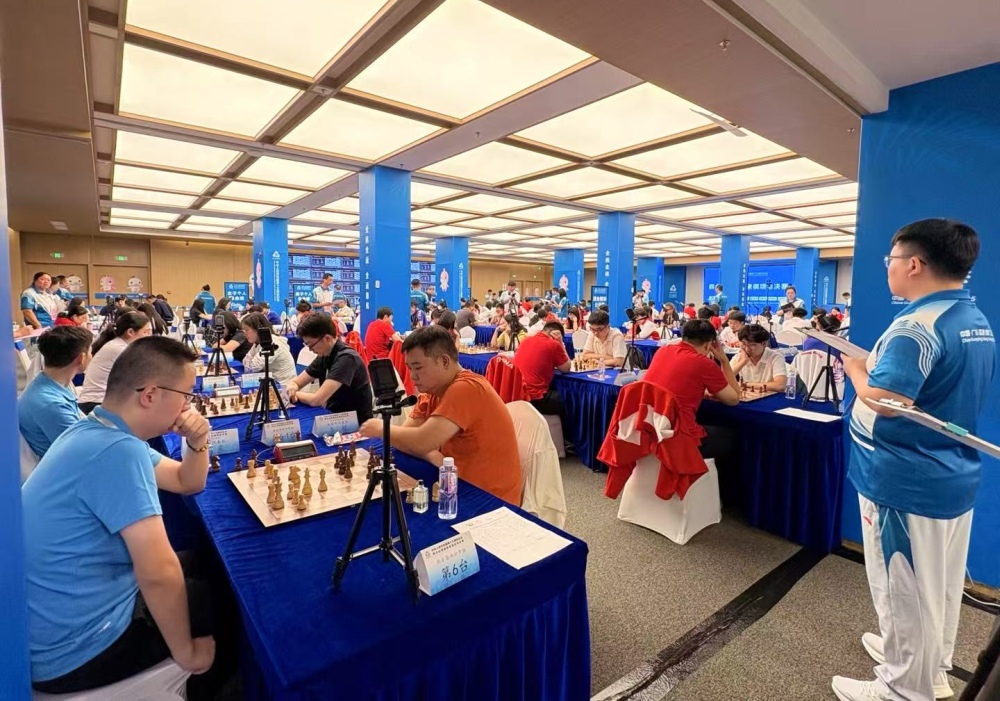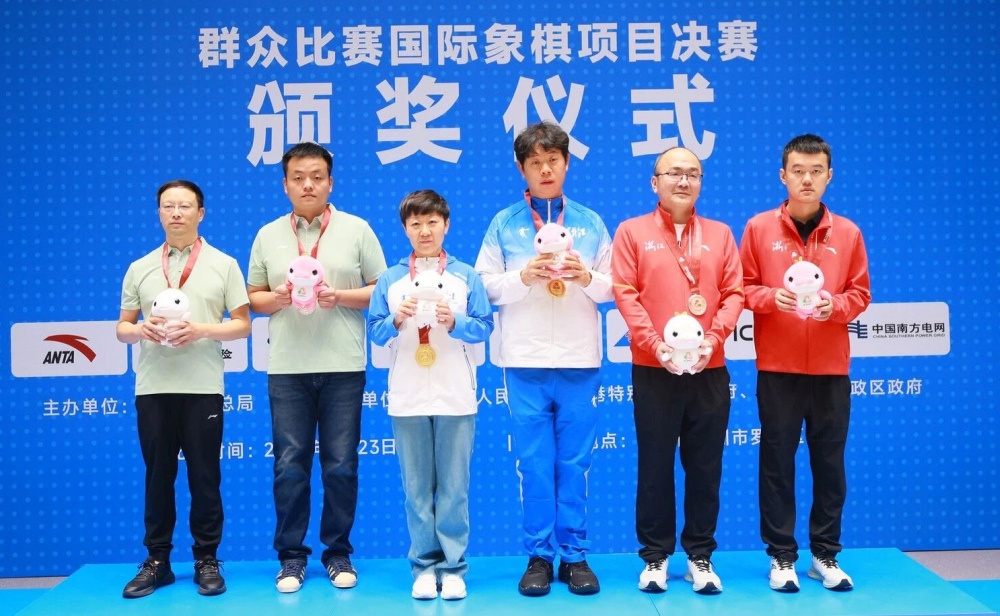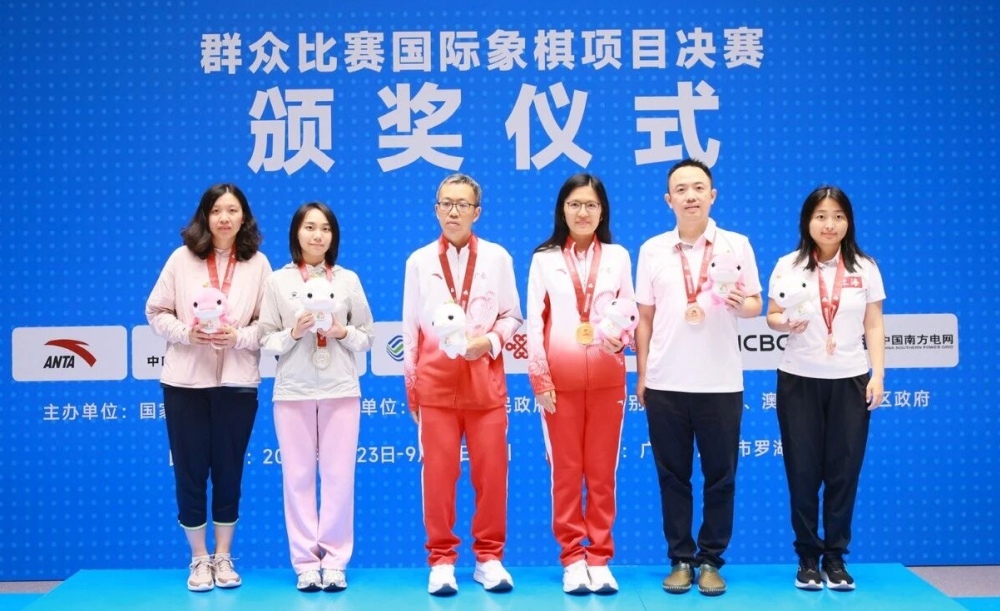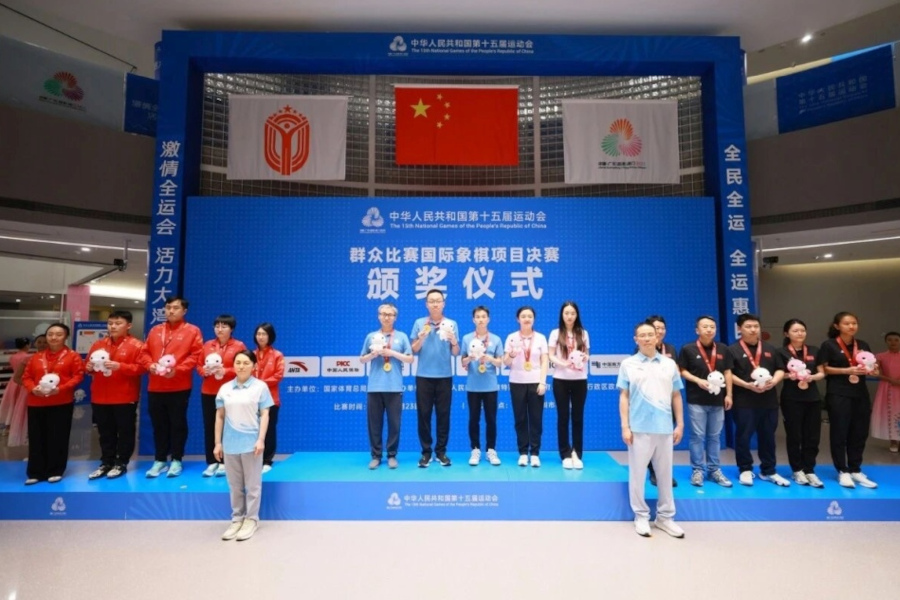A traditional multi-sport event
Press release by FIDE
Grandmasters Wang Hao and Hou Yifan emerged victorious in the Open and Women’s sections of the chess competition at the 15th National Games of the People’s Republic of China. The Jiangsu team won the team event, while Shandong and Hebei took silver and bronze, respectively.
The chess competition at the 15th National Games, the highest-level comprehensive multi-sport event in the country held every four years, took place in Shenzhen on 23-28 September. It attracted the strongest local players, including former world champions Ding Liren, Wei Yi and Yu Yangyi in the open, and women’s world champion Ju Wenjun, Hou Yifan, Lei Tingjie, and Zhu Jiner among the women.
In this insightful video course, Grandmaster David Navara shares practical advice on when to calculate deeply in a position — and just as importantly, when not to.
Free sample video: Introduction
Free sample video: Invisible moves
The event, played with a 25-minute plus 10-second increment time control, featured open, women’s and team sections and used a two-stage format: a round-robin preliminary stage followed by semifinals and finals contested by the top four players.

Open section
The preliminary stage of the open section produced a minor sensation as seventh-seed Xu Yinglun qualified for the semifinals alongside Wang Hao, Ding Liren and Xu Xiangyu, edging out higher-rated players Yu Yangyi and Lu Shanglei.
Both semifinals, Wang Hao v. Xu Yinglun and Ding Liren v. Xu Xiangyu, were tightly contested battles decided by tiebreaks. Wang Hao and Xu Xiangyu prevailed and advanced to the final. In the equally tense final, Wang Hao captured the title by winning the tiebreaker. Ding Liren defeated Xu Yinglun to claim the bronze medal.

Final standings – Round robin
The Classical Sicilian has stood the test of time as one of the most principled and fighting defences against 1.e4. With its rich history spanning world championship matches and modern elite tournaments, this opening remains a favourite among players who seek a dynamic, counterattacking approach without venturing into extreme theoretical battles like the Najdorf or Sveshnikov.
Free video sample: Introduction
Free video sample: 6.h3
| 1 | GM | Xu Xiangyu | 2615 | 8,5 | 0 |
| 2 | GM | Wang Hao | 2698 | 7,5 | 1 |
| 3 | GM | Xu Yinglun | 2508 | 7,5 | 0 |
| 4 | GM | Ding Liren | 2734 | 6,5 | 1 |
| 5 | GM | Yu Yangyi | 2714 | 6,5 | 0 |
| 6 | GM | Lu Shanglei | 2647 | 6 | 0 |
| 7 | GM | Zhao Jun | 2532 | 5,5 | 0 |
| 8 | IM | Wang Shixu | 2407 | 5 | 0 |
| 9 | FM | Yang Zilong | 2372 | 4,5 | 0 |
| 10 | GM | Li Di | 2548 | 4,5 | 0 |
| 11 | Huang Renjie | 2487 | 3,5 | 0 | |
| 12 | CM | Chen Hongye | 1950 | 0,5 | 0 |
All games – Round robin
All games – Knockout
Women’s section
In the women’s event, the top-rated players – Hou Yifan, Zhu Jiner, Ju Wenjun and Lei Tingjie – lived up to expectations and secured spots in the knockout stage. In the semifinals, Lei Tingjie defeated Ju Wenjun, while Hou Yifan prevailed over Zhu Jiner in a very close tiebreak.
Hou Yifan dominated the final, whitewashing Lei Tingjie 2-0 to claim the title. In the bronze medal match, Ju Wenjun beat Zhu Jiner in a tiebreak, completing the podium.

Final standings – Round robin
| 1 | GM | Hou Yifan | 2609 | 9 | 0 |
| 2 | GM | Zhu Jiner | 2548 | 8,5 | 0 |
| 3 | GM | Ju Wenjun | 2570 | 8 | 0 |
| GM | Lei Tingjie | 2565 | 8 | 0 | |
| 5 | IM | Song Yuxin | 2409 | 7,5 | 0 |
| 6 | Jiang Tianyu | 2169 | 6,5 | 0 | |
| 7 | Wang Qinxuanyi | 2265 | 5,5 | 0 | |
| 8 | WIM | Gao Muzi Yan | 2212 | 4,5 | 0 |
| 9 | WIM | Zhang Xiao | 2167 | 3,5 | 0 |
| 10 | WCM | Wu Shuang | 2026 | 2,5 | 0 |
| 11 | Shi Yige | 1889 | 2 | 0 | |
| 12 | WFM | Feng Yu | 2045 | 0,5 | 0 |
